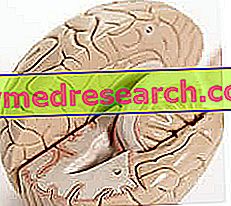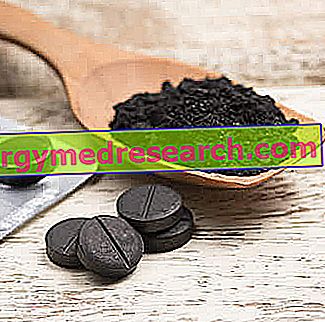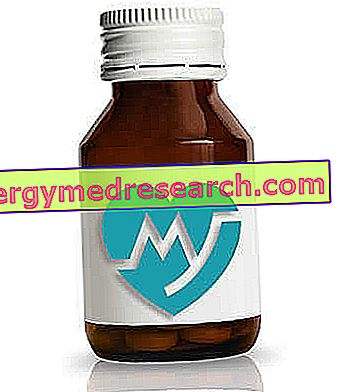Definition
Cushing's syndrome is the result of chronic exposure to high cortisol levels, resulting from excessive administration of corticosteroids or endogenous hypercortisolism. Cusching's syndrome is a serious pathology, although, fortunately, quite rare.
Causes
In the vast majority of cases, Cushing's syndrome is an expression of excessive and prolonged exposure to steroid-based drugs; other subjects develop the syndrome due to an endogenous hyperproduction of cortisol, the result, in turn, of tumors of the pituitary gland, lung cancer (Cushing syndrome dependent ACTH), adrenal adenoma and adrenal carcinoma (independent Cushing ACTH syndrome ).
Symptoms
The clinical-symptomatological picture of Cushing's syndrome consists of: amenorrhea, thinning of the skin, weight gain, increased risk of infections, depression, diabetes mellitus, decrease in muscle mass, full moon, hypertension, cardiac hypertrophy, hirsutism, reduced glucose tolerance, obesity, osteoporosis, infant growth retardation, metabolic syndrome, skin ulcers.
Information on Cushing Syndrome - Drugs for Cushing Syndrome Treatment is not intended to replace the direct relationship between health professional and patient. Always consult your doctor and / or specialist before taking Cushing's Syndrome - Cushing Syndrome Drugs.
drugs
The goal of treatment for Cushing's syndrome is to bring the body's cortisol levels back to normal; clearly, the best treatment option is subordinated to the nature of the etiopathological agent.
When Cushing's syndrome is favored by chronic and excessive exposure to corticosteroids (administration of systemic steroid drugs), the endocrinologist will probably propose a reduction in the dosage.
To understand: some diseases, such as severe asthma or rheumatoid arthritis, require prolonged administration of corticosteroids, which could promote the onset of Cushing's syndrome. In other pathological conditions it is not possible to reduce the dose of corticosteroids, since such an intervention would aggravate the underlying pathology.
It is recommended not to suddenly stop the administration of steroid drugs on one's own initiative. In some patients, corticosteroid dose reduction is not possible: in this case, the patient will have to regularly face medical checks on blood glucose, bone density and cortisol levels, and possibly undergo surgery.
Cushing's syndrome subject to ACTH overproduction due to pituitary tumors should generally be treated by surgical removal of the tumor and post-surgical radiotherapy; probably, as a result of these interventions, replacement therapy with hydrocortisone may be necessary, to be taken for life in order to ensure the body the right dose of steroid hormones.
Generally speaking, Cushing's syndrome is often treated with surgery; before undergoing the operation, the patient must normally follow a pharmacological therapy, in order to improve the characteristic signs and symptoms, minimizing the risk incurred during the operation.
We see below which drugs are used in therapy for the control of adrenal steroid hormone secretion.
- Ketoconazole (eg Ketoconazole EG): the recommended dose for Cushing's syndrome varies from 400 to 1200 mg per day, depending on the severity of the symptoms.
- Mitotano (eg Lysodren): this drug is particularly suitable for the treatment of inoperable adrenocortical carcinoma, which reflects Cushing's syndrome. It is a powerful drug, able to selectively inhibit the action of the adrenal cortex: according to this, we understand how a costicosteroid replacement cure is necessary following the administration of the drug. It is recommended to start therapy with a dose of mitotane of 2-3 g per day, evenly distributed during the 24 hours. After 8 weeks of treatment, it is recommended to reduce the dose to 1-2 grams / day.
- Dexamethasone (eg. Decadron, Soldesam): it is an inhibitor of pituitary secretion that does not have a mineralocorticoid action. The long duration of action of this drug is shown to be suitable for suppressing ACTH secretion in the context of familial adrenal hyperplasia. Normally, the recommended dosage of this drug is 1 mg, to be taken orally in the evening, to inhibit ACTH secretion. Consult your doctor. The administration of this drug is recommended in the evening, given that, being a glucocorticoid, it exerts its suppressive action at the level of the hypothalamic-pituitary-adrenal axis in a more prolonged and intense manner during this time of the day.
- Betamethasone (eg Celestone, Bentelan, Diprosone): this drug, just like the previous one, is an inhibitor of pituitary secretion, lacking - almost completely - a mineralocorticoid action. Administer the drug in the evening. The dosage should be established by the doctor based on the values of cortisol in the blood.
- Metirapone (Metopirone): the drug, belonging to the class of inhibitors of the adrenal cortex, is not marketed in our country; however, where its use is permitted, metirapone is used to control the symptoms that characterize Cushing's syndrome, especially before subjecting the patient to surgery to cure the disease. Indicatively, for Cushing's syndrome, take 0.25-6 grams of the drug per day, based on cortisol values. Consult your doctor.



